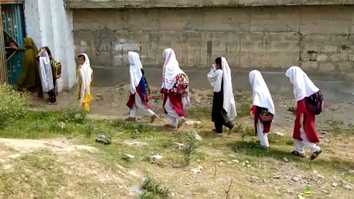KABUL -- Poverty, unemployment and a ban preventing girls from attending secondary school are among the factors that have led to the closure of more than 400 private schools across Afghanistan over the past year, according to educators.
"Unfortunately, most private schools are on the verge of collapse," said Zabihullah Forqani, a member of Afghanistan's private school association. "The underlying reasons are poverty, unemployment and the ban on girls' education beyond sixth grade."
"This situation has led to the closure of more than 400 private schools throughout Afghanistan" including 150 in Kabul and 250 in various provinces, he said.
About 3,600 private schools, including 1,200 in Kabul, were previously operating across Afghanistan.
Many Afghans have lost their jobs and businesses amid the economic downturn, making it difficult to pay for their children's school fees -- the sole source of income for private schools, Forqani said.
"Poverty and unemployment have caused not only a decrease in the number of student enrolments but also a financial crisis for private schools," he said.
"Recent developments have adversely impacted various parts of Afghans' lives, with the education sector being hit the most," said Jan Aqa Hikmat, principal of Noor Jahan Private High School in Kabul.
"There were 650 male and female students in 1st to 12th grade in our school in past years," he said. "But now there are only 215 students in our school."
Hopes and dreams on hold
If restrictions on girls' education continue, more private schools will close, said Forqani.
"Almost 30 to 40% of the students are girls in private schools throughout Afghanistan," he said. "Prohibiting girls from continuing their education will force many private schools to close, and if such a situation persists, more schools will be left with no choice but to close."
Such developments accelerate the destruction of the education sector, he said.
"Recent developments have affected various sectors of Afghan life, and unfortunately, the education sector has suffered more than any other sector," Bahara Mohammadi, owner and head of Star-e-Noor Jahan Private High School in Kabul, told Salaam Times.
"Most students cannot continue their education because of poverty," said Mohammadi. "Teachers also have lost their jobs, and private educational institutions are on the verge of a complete collapse."
Of the 480 students studying at Mohammadi's school, only 240 remain. The others were forced to drop out by poverty or the nationwide ban on girls.
Of the 21 teachers, 11 have lost their jobs since last August.
"School enrolment was beyond expectation until last year, and students attended their classes with great interest," Mohammadi said. "Moreover, students were very hopeful about their future, setting their sights on becoming doctors, engineers, pilots and teachers."
"However, their dreams seem to have disappeared today. They no longer have a smile on their face or any hope for a bright future."
"Half of my classmates, including our classmate who held the first rank and was very intelligent, were forced to drop out," said Mehdi, 12, a fourth-grader at Star-e-Noor Jahan.
"They became very poor and were unable to pay school fees. Moreover, they could not afford to buy books and stationery."
"I feel so sorry for my friends and classmates, and it is a great loss that they are no longer part of our class," Mehdi said.
The shutdowns have also been difficult for teachers.
"I was earning enough from teaching at a private school to support my five-member family," said Asifa Abedi, a teacher at a private school in Kabul city. She withheld the name of her school for security reasons.
"Student enrolment has dropped because of poverty and the economic crisis, and my salary has been reduced by 50%."
"If the situation continues like this, all schools will be closed and thousands of teachers will lose their jobs. Furthermore, in such a situation, unemployment and poverty will become widespread in society," Abedi said.
Lost achievements
For many educators, the greatest fear is having to give up two decades' worth of work.
"The establishment of private schools and universities was considered a major achievement in the education sector during the past two decades," said Sharifa Fahimi, a lecturer at a private university in Kabul.
Fahimi withheld the name of her university for security reasons.
"Thousands of educational institutions opened across Afghanistan. Meanwhile, hundreds of thousands of students graduated and the same number entered the labour market."
"If private education ceases its operations, not only will the achievements of the last 20 years be lost, but thousands will lose their jobs, and poverty and unemployment will become an evident predicament in the country," she said.

![First-grade pupils study in a class at Star-e-Noor Jahan private school in Kabul on August 14. [Sulaiman/Salaam Times]](/cnmi_pf/images/2022/08/18/36730-20220814_085919-585_329.jpg)






